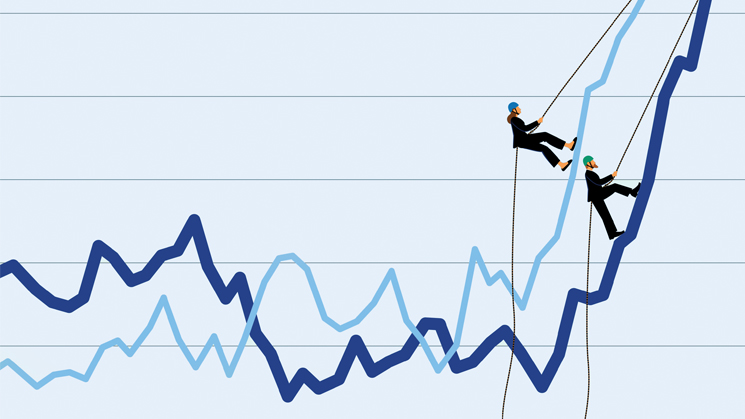The Great Compression
Biden’s tax proposal, COVID-19 and an abundance of dry power push deal volume to record levels.

Nearly two years into the COVID-19 pandemic, private equity is, once again, in Congress’ crosshairs. A plan to change capital gains tax has become less controversial in Washington, making it almost unavoidable, and placing mid-market firms and service providers in the position of having to race to ensure that deals get done before any legislation is enacted.
“Everyone is at capacity,” Winston & Strawn’s Co-Chair of Private Equity Eva Davis says. “Among my group in Los Angeles, and across the firm, we’re seeing more deals than ever on a per-attorney basis. Both volume and valuations are higher than ever.”
The convergence of pent-up demand due to COVID, combined with the growing availability of vaccines and excess capital in the market has led to frenetic activity, Davis says. Now, with capital gains on the plate, the number of deals has increased dramatically.
“We are seeing three years’ worth of deals coming to market this year: all of the deals that would have come to market last year but didn’t due to performance issues or market conditions; the deals that would normally be coming to market this year; and deals that might not have come to market until 2022, but have been accelerated due to concerns about higher capital gains taxes,” says Five Points Capital’s Director of Business Development Brent Kulman. “All of that is happening in a time of strong investor demand and continued low interest rates. It’s a very attractive time to be a seller.”
“Currently it’s still a seller’s market,” Davis says. “They can get favorable terms now but, at some point—possibly between September and December— that’s going to shift to the buyer,” she adds. Sellers need to get deals closed as soon as possible in order to maximize the chance that their sales proceeds will be earned under a lower capital gains regime.”
History Repeated
President Joe Biden, in April, released the American Families Plan, which includes roughly $1.8 trillion in investments and tax credits designed to provide childcare, education and direct financial support to more than 120 million households over the course of the next decade. The initiative, if passed by Congress, also seeks to eliminate the provision that has allowed capital gains to be taxed at rates lower than regular income.

The White House has decried the “unfair” nature of the current tax regime and seeks to raise the capital gains tax rate to 39.6% from 20%. The carried interest “loophole,” has also been targeted as a tool plutocrats use to enrich themselves at the public’s expense.
Biden’s proposal is the latest in a decades-long political struggle between Republicans and Democrats that has seen virtually no movement one way or the other.
“The carry issue came up about 13 to 14 years ago,” says Alan Levine, Co-Chair of Morrison Cohen’s Executive Compensation & Employee Benefits Department. “We’ve seen a couple of administrations and Congresses at this point, but nothing except for the Trump administration extending the holding period for carried interest.”
Levine notes that the Tax Cuts and Jobs Act of 2017, failed to make any substantive change to the issue.
“Because the private equity holding period is typically longer than three years, I don’t think that had a significant impact on solving what Congress had, at the time, perceived to be an issue,” he adds.
Today, however, there aren’t many who think Congress will restrict itself to legislating around the margins. In addition to President Biden’s proposal, another introduced by Senators Ron Wyden and Sheldon Whitehouse—the Ending The Carried Interest Loophole Act—seeks to close the entire carried interest loophole, effectively making it impossible for private equity firms to defer tax payments.
We are seeing three years’ worth of deals coming to market this year … All of that is happening in a time of strong investor demand and continued low interest rates. It’s a very attractive time to be a seller.
Brent Kulman
Director of Business Development, Five Points Capital
“If there is an increase in capital gains, I don’t think there will be much of an impact to private equity,” Levine says. If the carried interest loophole is eliminated, it “may morph the arrangements between the sponsors and their LPs in ways that change the structures, the form that carry takes and possibly the overall payments to private equity sponsors where investors get a significant return,” Levine explains.
“The legislation may change the landscape, but I don’t know if it significantly damages the industry, because private equity is an asset class that has strong business reasons for existing, including diversification of investment portfolios,” Levine says. “A tax is important but it’s not the sole defining feature.”
Unprecedented Deal Flow
Defining feature or not, the market’s response to the likelihood of a substantive tax change has pushed deal flow to unprecedented levels.
The pandemic’s effect on commerce has also boosted activity to new heights. The “COVID bump,” in which companies that provide services or make products that are specifically suited to life in lockdown, have come to market, adding to the volume of deals and challenging service providers.
“Deal flow peaked in June and July as those sellers are focused on getting their deals done before the end of the year, and deal flow is usually lower for August,” Kulman says. “The bigger issue lies with all of the other parties involved in getting a deal closed. You need accountants to do Q of E (quality of earnings) work, law firms for documentation and advisors for a variety of other matters. We’re seeing some clogging of the arteries with the service providers.”
Law firm Paul Hastings, for example, is hiring “aggressively” at all levels, from partners to junior associates, according to Global Private Equity Chair Brian Richards. “People are selling whatever isn’t nailed down; whatever has value that they think is mature enough,” Richards says. “It’s a great time to sell.”
Staying the Course
Lawyers and other service providers may be ramping up staff to deal with skyrocketing deal flow, but private equity firms are remaining steady in terms of adding staff.
Kulman says that his firm has added a few people over the last year and notes that, while the firm is fully staffed at the moment, it is looking to bring on additional resources in the next six months to expand the business development effort. Similarly, private investment firm VSS, having seen a 15% increase in the number of deals reviewed from 2019 to 2020— before the pandemic—has added a limited number of associates, according to Managing Partner Jeffrey Stevenson.
Sellers need to get deals closed as soon as possible in order to maximize the chance that their sales proceeds will be earned under a lower capital gains regime.
Eva Davis
Co-Chair of Private Equity, Winston & Strawn
Some firms have maintained that low interest rates, coupled with an abundance of capital on the sidelines and a shift toward a remote economy, have created a situation where the increase in deal volume has been normalized to a degree.
“Before the pandemic, financial institutions had been expecting a market correction and investors were holding a lot of dry powder on the sidelines. Then, COVID hit and a number of opportunities emerged,” Randi Mason, the co-chair of Morrison Cohen’s corporate department, says. “First, there were companies that happened to be well positioned for the pandemic—offering virtual and remote products and services, such as Zoom and home fitness, personal health and PPE. Prior to COVID, there was a shift toward virtual and remote businesses anyway. These businesses were established and COVID only accelerated the shift that had already been happening. Investors have been rushing to take advantage of these opportunities.”
According to Mason, the availability of distressed assets owing to COVID has had an impact, too.
“At the same time, there were businesses, like retail and hospitality, which were hit hard and distressed investors rushed in,” she says. “It’s a perfect storm in which there is a lot of capital available, there is a positive market disruption and a distressed market happening at once.”
George Henry, managing director at private equity firm Lincolnshire Management, says that the number of deals his firm looks at has increased by 160% between 2018 and 2020, and limited the time available to review more complex opportunities.
“We’ve remained disciplined and have even had to be ruthless in some ways,” Henry says. “We may have had to pass on deals where we ultimately know it is not a fit for us. In a less busy environment, we might take a little more time on those kinds of deals. Now, those are pushed to the side quickly.”

Mason says that people are taking advantage of the “COVID bump” among businesses that have performed well because of the pandemic.
“I think that some companies, investors and funds are now trying to sell before the effects of the COVID bump wane. The challenge for investors is trying to normalize and understand how much of a bubble the COVID bump really is,” Mason explains.
She adds that there are also investors who are trying to find assets that are not overvalued because of COVID. “There’s so much competition for well-positioned businesses. People are looking for that gem that’s attractive, but not overvalued. In addition, lately we’re also seeing more and more capital taking advantage of distressed opportunities. It is becoming more clear who has weathered the storm and who has not. Sponsors and strategics are trying to pick up the ‘carcasses left on the side of the road.’”
Kulman says that buyout activity is strong at Five Points Capital, which focuses on B2B services businesses, and that his firm has issued a record number of outstanding indication of interest letters. The pandemic has prompted a greater degree of activity across the board and a casual observer wouldn’t need to look any further than Amazon or Netflix to understand that there are a great number of businesses that have benefited from COVID. For private equity, the issue is determining whether businesses that have thrived during the pandemic can remain viable in a less volatile environment.
What Comes Next
Congress hasn’t devoted much time to revising the present tax regime, focusing instead on issues such as infrastructure and the vaccine rollout while buyouts and exits continue to pile into the market. With a fair degree of political will now pushing for changes to capital gains and carried interest, the issue for many is not whether the changes will happen, but their extent.
“The consensus appears to be that the tax rates will change, but that Biden has proposed a 43% capital gains rate to begin a negotiation,” Richards says. “I think he’ll get something around 28%- 31%. A meaningful portion of deal flow today is driven by people who want to close their transactions before rates change so they do not have to pay as much to the government when new rates go into effect, which we expect to be on, or shortly after, January 1.”
At the same time, others, including Winston & Strawn’s Davis, think that carried interest benefits will be completely eliminated, or changed to such a degree that fund managers may not be able to access them.
It’s a perfect storm in which there is a lot of capital available, there is a positive market disruption and a distressed market happening at once.
Randi Mason
Co-Chair, Corporate Department, Morrison Cohen
“The changes will come through; carried interest benefits will almost certainly be gone, or if not completely gone, the hold period to enjoy those benefits will be longer than three years,” Davis says.
There are other service providers, such as Levine, who are positing that an increase in the capital gains rate will serve as a compromise in Congress to keep the carried interest tax treatment in place. However, investors are more circumspect.
“Taxes will be what they will be,” Kulman says. “If I was going to bet, I’d say that there will be a tax increase on capital gains, but that it will be a more moderate increase than has been proposed. People will learn to live with it. It won’t change what we do, which is to raise funds, and invest where we see opportunities to grow businesses and realize capital gains.”
Kulman adds that changes in interest rates are ultimately more important than any change in capital gains.
“Interest rates will have a greater impact on valuations than capital gains rate increases. If capital gains were increased to the 35-40% levels we saw in the early 1970s it would be different, but I suspect we’re not going to go through that.”
Regardless of any changes that may be underway in Congress, it is unlikely that private equity’s approach to dealmaking will shift dramatically, according to Jeff Magny, founder and managing partner at private equity firm Lincoln Road Global Management.
“Private equity firms will continue to do deals,” he says. “We are going to control what we can control, focus on finding great businesses and generating strong returns for our investors.”
Carl Winfield is a New York-based writer covering finance and sustainability.


